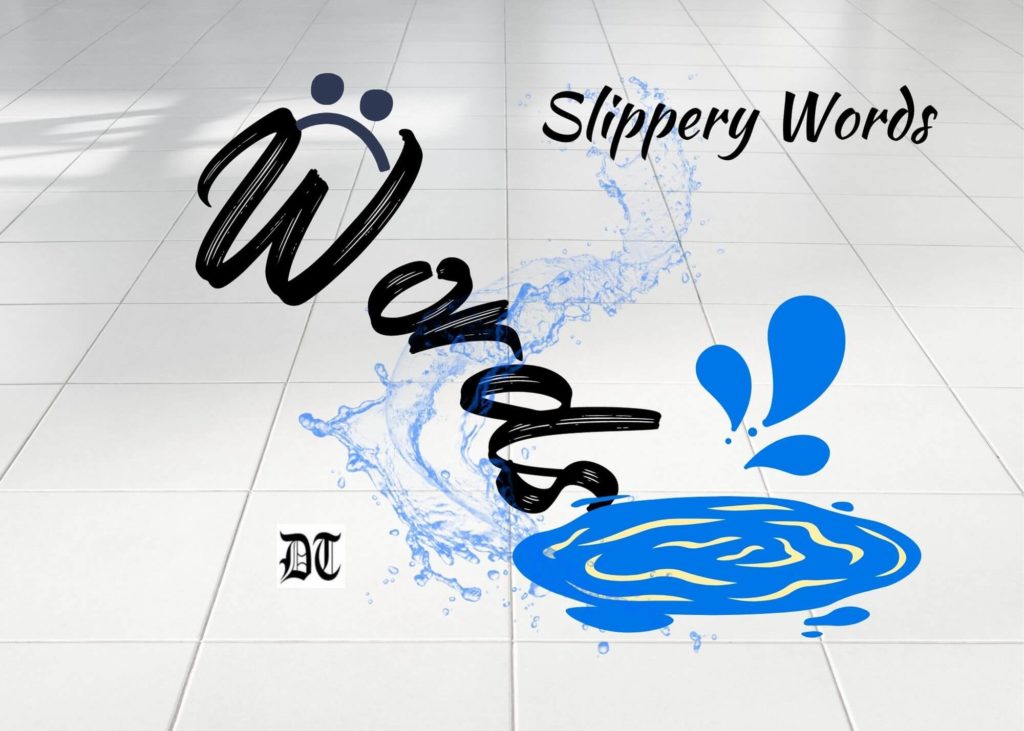Dr. Swaraj takes us through the complexities of language and grammar, in this erudite exposition. An exclusive for Different Truths.

It was a silhouetted image of a fisherman casting his net in shimmering, coppery waters. I stood mesmerised before the photograph, absorbed completely in it. The picture of the gaunt figure in loincloth against the orange-red horizon was hauntingly beautiful. The sun, a sphere ablaze, seemed to have set the waters of Periyar on fire.
The occasion was a photographic competition held at a local engineering institute. As I stood absorbed in the photograph, a story started unfolding itself in front of me. It was the story of that fisherman’s unending toil, perseverance and fortitude. Woven into this story was also his dream to own the sun. He seemed to be casting his net to catch the setting sun as well. The subject of the image, however, was no more a singular character. The toiling fisherman had merged into the old farmer of Edwin Markham’s The Man with the Hoe. Markham’s poem itself was inspired by Millet’s painting by the same title.
Reverie Disrupted
Suddenly a young boy and a girl came and stood near me watching the same image. The boy shouted ecstatically, disrupting my reverie, “Wow! What an ultimate photograph!” While I lingered there admiring the image, those merry youngsters moved to another exhibit. I heard the same exuberant voice, much louder this time than before: “Arrey yaar, yeh to pehle wali se bhi zyada ultimate hai! … O dear, this one is more ultimate than even the previous one!” And then there was a pause followed by sparkling laughter. If the high-pitched grammatical blooper was a jolt, the laughter was unforgivably irreverent. The same excited voice fell once again on my eardrums like a hammer this time: “This one is the most ultimate!” The laughter had moved to the farthest corner of the long, semicircular gallery. I heard it from afar. Subdued and faint, this time. Perhaps they had found another ultimate image.
I stood there rooted, as if in a stupor. To me the word ‘ultimate’ always denoted something ‘final’, ‘the best’ or the ‘most extreme.’ Did it have comparative and superlative degrees too, that I didn’t know of? How did they dare take such liberties with the English language?
English teachers like me from the old school are often obsessed with English ‘as she is spoke’.
English teachers like me from the old school are often obsessed with English ‘as she is spoke’. We expect perfect pronunciation and unblemished grammar. And in the course of our teaching careers we develop some hypersensitive firangi feathers also. Even minor deviations from grammatical norms appear as acts of solecism inviting reprimand. The firangi feathers keep getting ruffled by our pupils’ aberrant expressions. The grammar policeman in me was hurt and enraged by the slaughter of ‘ultimate’.
On reaching home, I started thinking about it. The sense of shock gave way to cool contemplation. Many troubling questions came to my mind. What, after all, is the language of joy? If not enraptured exclamations and interjections that never obey any rules of grammar? Boundless elation was what that boy wanted to express. And he did that, with chutzpah and abandon that is intrinsically antinomian. For that matter, what is the language of pain? If not groans, howls and wails?
Grammars Leak
Impassioned communication has a life beyond grammar or even beyond language itself. Edward Sapir, an American anthropologist-linguist, famously states that “All grammars leak”. They leak maximally when they cannot accommodate deep feelings. Let grammars leak. Let a million linguistic transgressions bloom. So long as the utterance remains truthful to the feeling or thought, transgressions are no offence.
Zorba, the protagonist of Nikos Kazantzakis’s novel Zorba the Greek embodies Dionysian passion for life. Santuri, a sort of zither he plays in his moments of ecstasy. When he confronts the poverty of language in expressing his joy his santuri comes to his aid. Not only does he play santuri on such occasions, he even dances. His music and dance become the language of his ecstatic joy.
Do linguistic conventions not try to contain and sanitise the chaos of profound feelings?
Do linguistic conventions not try to contain and sanitise the chaos of profound feelings? Should we, the English teachers, make straitjacket conventions a fetish? Should our concern be leaking grammar or debasement of language? The debasement we witness day in and day out? The issue of defilement of language must take precedence over grammaticality and pronunciation.

Slippery Words
Words, after all, are not innocent. Language constructs our universe for us. Words, far from being just names of things, define parameters of our thought. They predispose us to think in a particular way. Meanings are often overdetermined as words come accompanied by ghosts of their past affiliations. Words are slippery as Eliot suggests in his Four Quartets:
Words strain,
Crack and sometimes break, under the burden,
Under the tension, slip, slide, perish,
Decay with imprecision, will not stay in place,
Will not stay still.
Given their fluidity and slipperiness, words do not often capture what we want to say. They are always reaching out to a world beyond our power of communication. The Royal Society of London founded in 1660, did think of a solution to this conundrum. The Society’s motto “nullius in verba” (“take nobody’s word for it”) warned against beguilement by words.
Owing to their malleability, words can be given a spin to knowingly lead people astray.
Owing to their malleability, words can be given a spin to knowingly lead people astray. On such occasions, words act as a smokescreen. They occlude reality. Since the intention is to obfuscate, communication becomes a deliberate act of miscommunication. Sophisticated jargon, weasel words, dog whistles and passive, convoluted constructions befog the real intention. Politicalese, journalese, bureaucratese and legalese are riddled with deliberately deceptive expressions. Rabble-rousers and demagogues in particular, have perfected the art of telling lies without appearing to do so. We become willing victims of their verbal skulduggery.
We allow ourselves to be inveigled into that trap where the biggest casualty is truth. Not only this, over a period of time, we ourselves become competent dissemblers. We become adept at using the same debased language to which we surrender our agency. And with the corruption of language, as George Orwell argued, begins the corruption of society.
Linguistic and Political Corruption
This linguistic and political corruption should be the prime concern of language teachers. Not the leaking grammar. Or perfect pronunciation, which itself is a mirage.
In his essay “Politics and the English Language” Orwell raises some pertinent questions about degradation of language. He discusses many ways in which language is debased. Use of dead metaphors, clichés, passive constructions, euphemisms, and jargon draw his ire the most.
The language of war is notorious for being the language of euphemism, equivocation, circumlocution, and prevarication.
The language of war is notorious for being the language of euphemism, equivocation, circumlocution, and prevarication. An analysis of the language employed to report the US led war on Iraq (2003 – 2011) is an eye opener. It reveals how war reporting threw up a new language. It sought to deliberately obfuscate reality while claiming for itself the status of truth.
Many cloying neologisms were employed to justify the patently unjust war. The most infamous examples being: “Operation Infinite Justice”, “Operation Iraqi Freedom”, and “Operation Enduring Freedom.” Misleading terms like “surgical strike” “collateral damage” and “friendly fire” were employed to lessen the impact of atrocity. The bloody, internecine civil strife that followed the US war on Iraq was called ‘sectarian conflict’.
Idea of a Just War
Nuclear weapons in the hands of the US were (and are) nuclear deterrent. They were Weapons of Mass Destruction (WMD) if Iraq owned them, which it never did. The idea of a just war was sold successfully to the gullible public. This is how consent for the war was manufactured.
…the war mongers also employed deceptive language to befuddle people.
Not only this, but the war mongers also employed deceptive language to befuddle people. With no evidence of Iraq possessing WMD, the failure of intelligence became a big issue. The then Secretary of Defence Donald Rumsfield’s gave a press briefing on February 12, 2002. His words are a classic example of linguistic sophistry. He said, “Reports that say that something hasn’t happened are always interesting to me . . . Because as we know, there are known knowns; there are things we know we know. We also know there are known unknowns; that is to say we know there are some things we do not know. But there are also unknown unknowns — the ones we don’t know we don’t know.” This tautology and verbal jugglery can put any sophist to shame.
The problem actually lies in the deceptive language vitiating our minds. According to Orwell, if “thought corrupts language, language can also corrupt thought.” And the usage of bad language spreads by tradition and imitation. But we, the language teachers, who should be concerned about this aspect of language behave like old stick-in-the-mud grammarians.
Sell Untruths
We are not usually concerned about the spin doctors taking us for a ride. They employ euphemisms to sell untruths. Repeated untruths A few examples from Spinglish: The Definitive Dictionary of Deliberately Deceptive Language, prove illustrative. A homeless person is an ‘outdoor citizen’. A company firing its employees is ‘offering a package’. Making workers do more for less is called ‘labour reform’. Workers hired to break a strike are ‘replacement workers’. Bad loans are ‘NPAs,’ and shrinkage of corporate revenue is ‘negative growth’. Killing the enemy is ‘neutralizing’ them. An unkept election promise by a political leader that took him to power is ‘non-core-promise’. In India the native term for ‘non-core-promise’ is obviously ‘jumla’.
Our country is also witnessing the use of a special kind of political, context specific Spinglish.
Our country is also witnessing the use of a special kind of political, context specific Spinglish. Rationalists and scientists who question irrational ways are ‘pseudosecular’ and secularists are now ‘sickular’. Words like ‘democracy’, ‘freedom’, ‘nationalism’, ‘nationalist’, ‘terrorist’, ‘taliban’, ‘jehad’ and ‘jehadi’ have become empty signifiers. Their random, indiscriminate use means that these terms are self-serving, omnibus terms. Hence, these terms can be given a multidirectional spin.
Widespread prevalence of Spinglish makes Henry Beard and Christopher Cerf, the authors of Spinglish claim that “thanks to this shoot-from-the lip glossary of time-tested, tried-and-untrue terminology, you, too, can have just the right self-serving phrase at the tip of your tongue, and no matter how embarrassing the situation or awkward the silence, you’ll never be at a loss for misleading words again.”
First, we are misled and then we mislead.
Deceptive Language
How the deceptive language has imprisoned our minds is the topic of a joke narrated by Slavoj Zizek. It is reproduced below as it is from his text Zizek’s Jokes: Did You Hear the One About Hegel and Narration?
In an old joke from the defunct GDR, a German worker gets a job in Siberia; aware of how all mail will be read by censors, he tells his friends: “Let’s establish a code: if a letter you will get from me is written in ordinary blue ink, it is true; if it is written in red ink, it is false.” After a month, his friends get the first letter, written in blue ink: “Everything is wonderful here: stores are full, food is abundant, apartments are large and properly heated, movie theatres show films from the West, there are many beautiful girls ready for an affair — the only thing unavailable is red ink.
This is our situation today. The semantic domain of terms such as freedom, democracy, secularism, nationalism is stretched in all possible, mutually contradictory directions. Consequently, they do not mean much. They just mystify our thinking. Our responsibility as language teachers is to be aware of the difference between blue and red ink. And if possible, then to make the red ink available to our pupils. Grammar will take care of itself.
Visuals by Different Truths






 By
By
 By
By
 By
By
Wonderful article. Beauty of whatever Swaraj writes lies in the fact that he does not impose his ideas and yet his ideas are very imposing, as they spring up from his vast readings, close observations and his disturbed mind that is the direct outcome of all that is happening around us. The purity of langugae is nectar but becomes poison if the mind and intent behind it is impure.
I always start his article as a light piece of enjoyment and entertainment but don’t even know when it becomes full of substance and thought provoking.
Dear Sir, you are very generous in your praise. It is my good luck that you’ve liked this piece. Your words are a huge encouragement. I am grateful to you, Sir.
Although i had decided to wait till morning to read this article (a treat) since i was occupied in a medical emergency, the ever growing curiosity to enjoy the article by my esteemed friend won the race of patience and made me to read it today itself. Yes, this undoubtedly is a masterpiece from Dr. Swaraj Ji. The mention of grammer leakage, juggling of words as used by the American Secretary at times of justifying war with Iraq is really like untying the tied knots of words & deliberately creating confusions to let the confusion remain a confusion forever. All the quoted examples are marvellous & worth reading again & again. I confess very openly that i am not a person competent enough to comment in the field of literature, because of my background in social sciences only, yet i shall not be able to stop myself questioning the “always right” Queens English. Why so? Till date i am not known to the reason of enforced legitimacy of silent letters. I am reminded of another funny incident when Dharmendra asks why put is pronounced “पुट” and but is pronounced as ” बट”…. in movie Chupke Chupke as an effort to tease Language freak Om Prakash. What i am trying to convey is that there are endless mysteries when English is spoken. Ironically and sadly too, the netizens of today have developed a new age (internet age) English which is altogether a different ballgame, it is beyond the domain of Grammer but tightly linked to “understanding the intent” rather the content. Congratulations Dr. Sahib for producing another marvel of writing.
Thanks, Prof. Sharma. Your comments add many new dimensions to what I’ve written.
Deceptive language which is being rampantly used these days by the action doers to justify their actions, right and wrong, certainly misleads the reader or the listener. That is why critical thinking is being emphasised by the right academicians to be wary of these deceptors . Sir, your subject and subject matter are brilliantly chosen and enlightening.
Thanks a lot, Prof. Virk, Sir. Your comments really mail the issue.
Thanks Dr. Swaraj Raj Ji. My honor if you feel so.
Yet another lovely piece with an educative rather startling INSIGHT. It is and can be an eye opener to many English language teachers. It’s pretty strange that we very comfortably allow the true meaning of a word suffer in the name of politically or socially built context. The softening effect of language to mystify the multilayered destruction which war causes is really need of the hour. Salute the spirit and the adroitness of true language maestro.
Thanks a lot, Manoj. Your encouraging comments are really welcome and appreciated.